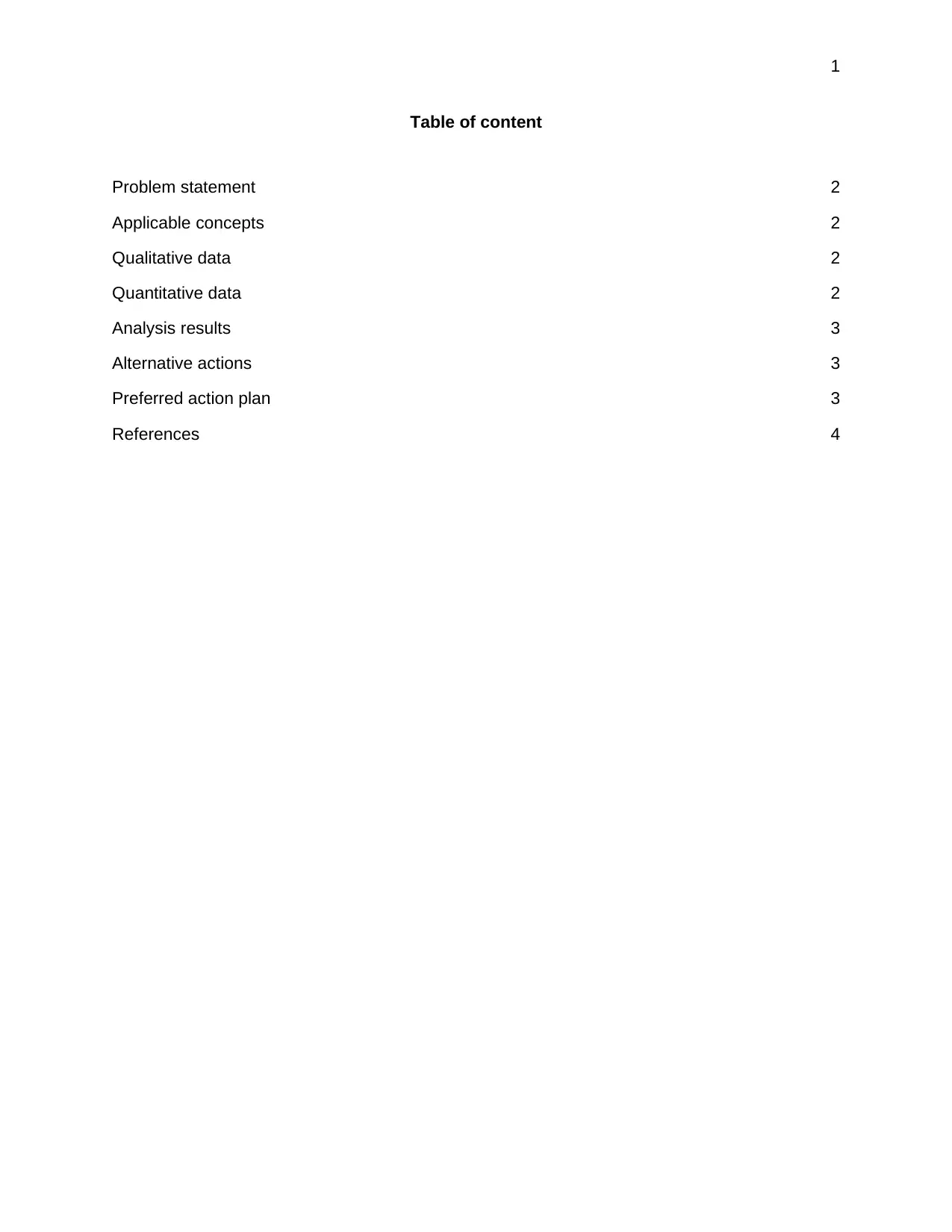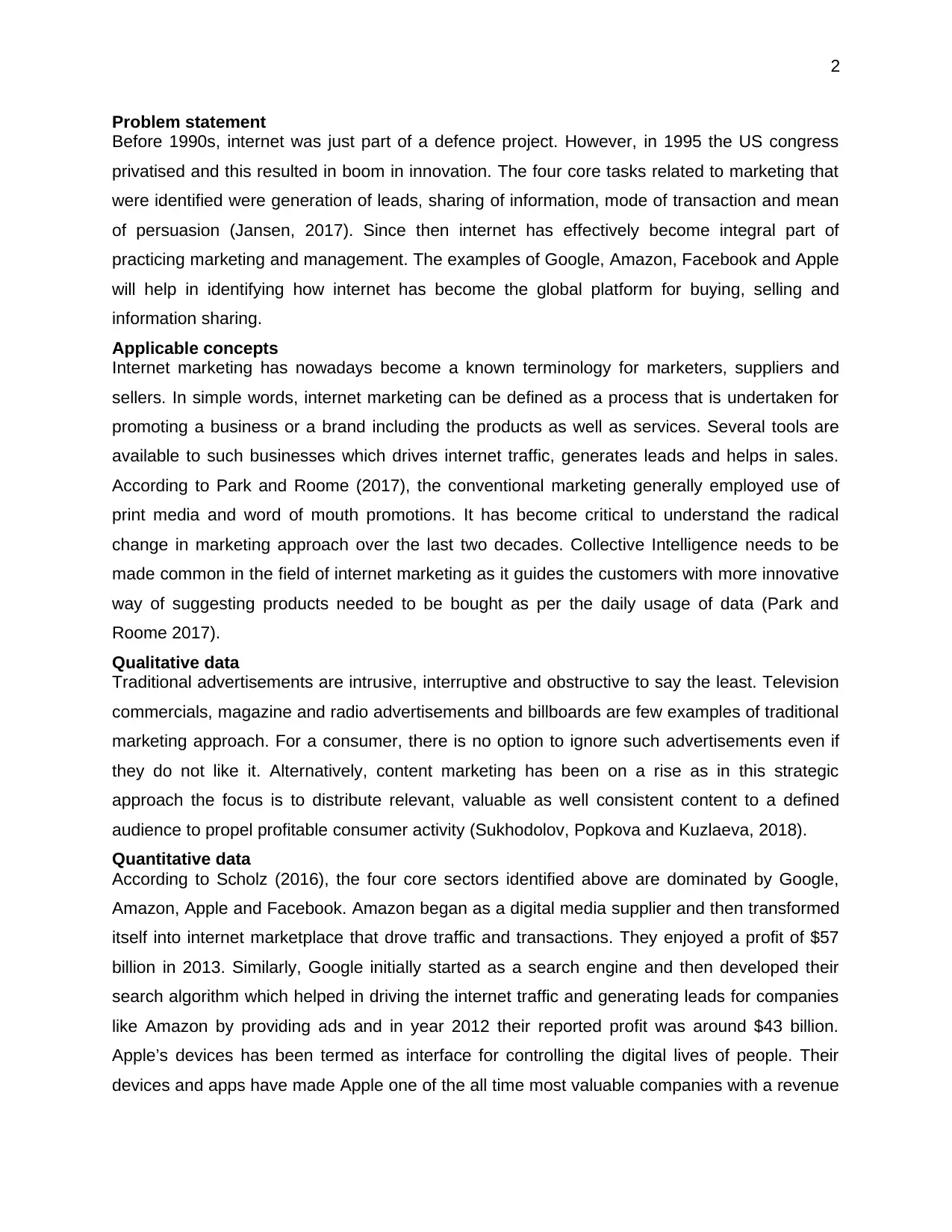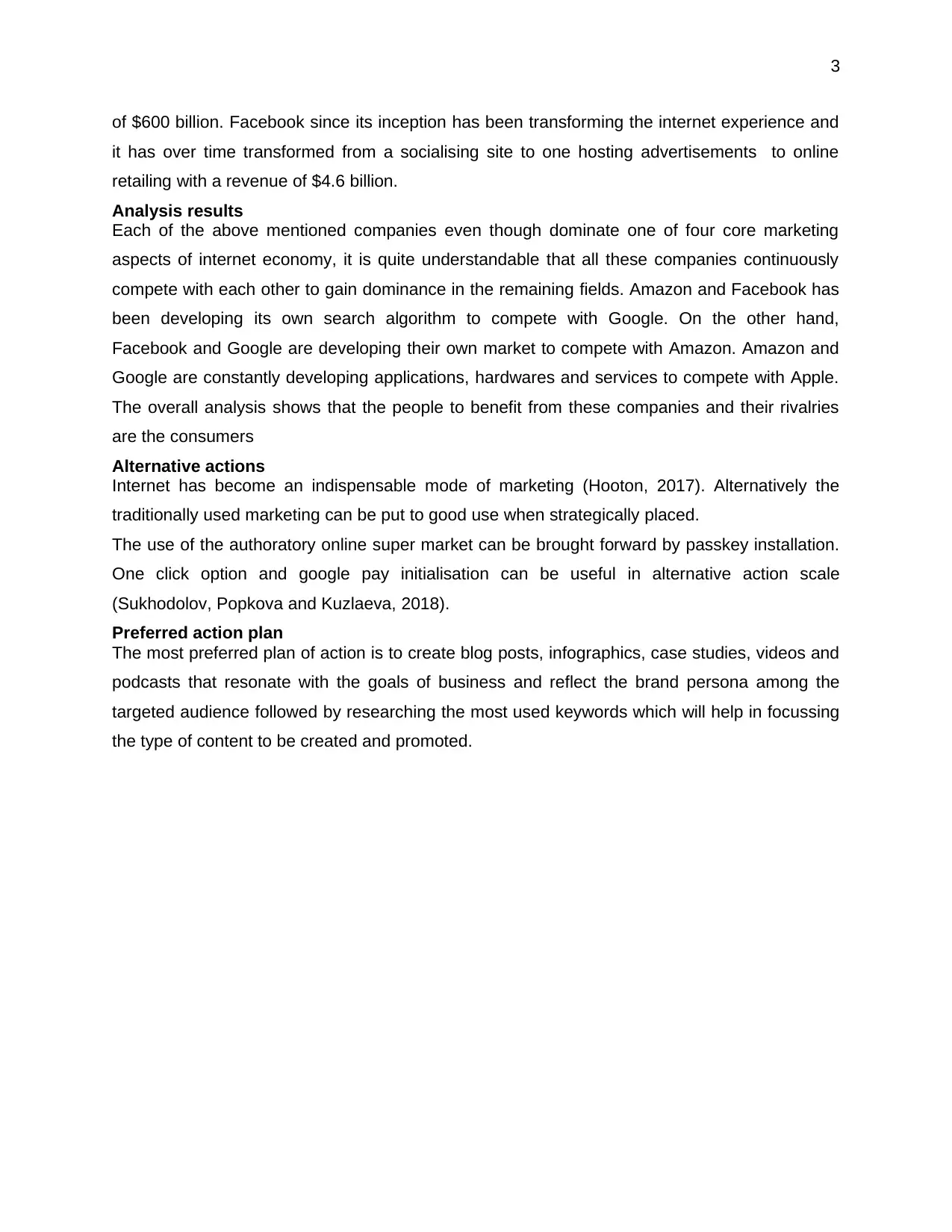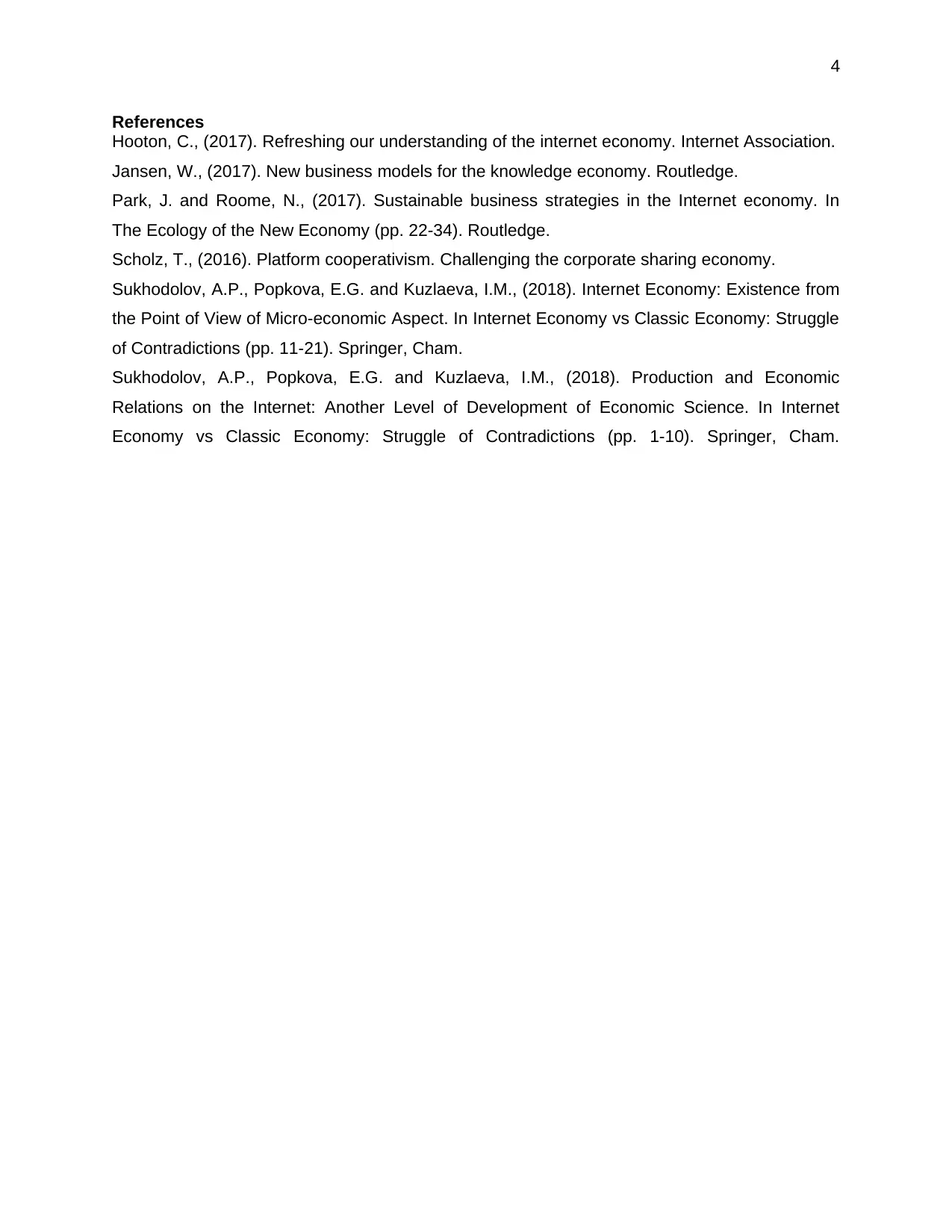Analysis of Internet Marketing Trends and Strategies Report
VerifiedAdded on 2023/04/24
|5
|996
|65
Report
AI Summary
This report provides a comprehensive analysis of internet marketing, tracing its evolution from the pre-1990s to its current dominance. It defines internet marketing, highlighting its tools and strategies for promoting businesses and brands. The report examines qualitative data, contrasting traditiona...

MANAGEMENT
Paraphrase This Document
Need a fresh take? Get an instant paraphrase of this document with our AI Paraphraser

1
Table of content
Problem statement 2
Applicable concepts 2
Qualitative data 2
Quantitative data 2
Analysis results 3
Alternative actions 3
Preferred action plan 3
References 4
Table of content
Problem statement 2
Applicable concepts 2
Qualitative data 2
Quantitative data 2
Analysis results 3
Alternative actions 3
Preferred action plan 3
References 4

2
Problem statement
Before 1990s, internet was just part of a defence project. However, in 1995 the US congress
privatised and this resulted in boom in innovation. The four core tasks related to marketing that
were identified were generation of leads, sharing of information, mode of transaction and mean
of persuasion (Jansen, 2017). Since then internet has effectively become integral part of
practicing marketing and management. The examples of Google, Amazon, Facebook and Apple
will help in identifying how internet has become the global platform for buying, selling and
information sharing.
Applicable concepts
Internet marketing has nowadays become a known terminology for marketers, suppliers and
sellers. In simple words, internet marketing can be defined as a process that is undertaken for
promoting a business or a brand including the products as well as services. Several tools are
available to such businesses which drives internet traffic, generates leads and helps in sales.
According to Park and Roome (2017), the conventional marketing generally employed use of
print media and word of mouth promotions. It has become critical to understand the radical
change in marketing approach over the last two decades. Collective Intelligence needs to be
made common in the field of internet marketing as it guides the customers with more innovative
way of suggesting products needed to be bought as per the daily usage of data (Park and
Roome 2017).
Qualitative data
Traditional advertisements are intrusive, interruptive and obstructive to say the least. Television
commercials, magazine and radio advertisements and billboards are few examples of traditional
marketing approach. For a consumer, there is no option to ignore such advertisements even if
they do not like it. Alternatively, content marketing has been on a rise as in this strategic
approach the focus is to distribute relevant, valuable as well consistent content to a defined
audience to propel profitable consumer activity (Sukhodolov, Popkova and Kuzlaeva, 2018).
Quantitative data
According to Scholz (2016), the four core sectors identified above are dominated by Google,
Amazon, Apple and Facebook. Amazon began as a digital media supplier and then transformed
itself into internet marketplace that drove traffic and transactions. They enjoyed a profit of $57
billion in 2013. Similarly, Google initially started as a search engine and then developed their
search algorithm which helped in driving the internet traffic and generating leads for companies
like Amazon by providing ads and in year 2012 their reported profit was around $43 billion.
Apple’s devices has been termed as interface for controlling the digital lives of people. Their
devices and apps have made Apple one of the all time most valuable companies with a revenue
Problem statement
Before 1990s, internet was just part of a defence project. However, in 1995 the US congress
privatised and this resulted in boom in innovation. The four core tasks related to marketing that
were identified were generation of leads, sharing of information, mode of transaction and mean
of persuasion (Jansen, 2017). Since then internet has effectively become integral part of
practicing marketing and management. The examples of Google, Amazon, Facebook and Apple
will help in identifying how internet has become the global platform for buying, selling and
information sharing.
Applicable concepts
Internet marketing has nowadays become a known terminology for marketers, suppliers and
sellers. In simple words, internet marketing can be defined as a process that is undertaken for
promoting a business or a brand including the products as well as services. Several tools are
available to such businesses which drives internet traffic, generates leads and helps in sales.
According to Park and Roome (2017), the conventional marketing generally employed use of
print media and word of mouth promotions. It has become critical to understand the radical
change in marketing approach over the last two decades. Collective Intelligence needs to be
made common in the field of internet marketing as it guides the customers with more innovative
way of suggesting products needed to be bought as per the daily usage of data (Park and
Roome 2017).
Qualitative data
Traditional advertisements are intrusive, interruptive and obstructive to say the least. Television
commercials, magazine and radio advertisements and billboards are few examples of traditional
marketing approach. For a consumer, there is no option to ignore such advertisements even if
they do not like it. Alternatively, content marketing has been on a rise as in this strategic
approach the focus is to distribute relevant, valuable as well consistent content to a defined
audience to propel profitable consumer activity (Sukhodolov, Popkova and Kuzlaeva, 2018).
Quantitative data
According to Scholz (2016), the four core sectors identified above are dominated by Google,
Amazon, Apple and Facebook. Amazon began as a digital media supplier and then transformed
itself into internet marketplace that drove traffic and transactions. They enjoyed a profit of $57
billion in 2013. Similarly, Google initially started as a search engine and then developed their
search algorithm which helped in driving the internet traffic and generating leads for companies
like Amazon by providing ads and in year 2012 their reported profit was around $43 billion.
Apple’s devices has been termed as interface for controlling the digital lives of people. Their
devices and apps have made Apple one of the all time most valuable companies with a revenue
⊘ This is a preview!⊘
Do you want full access?
Subscribe today to unlock all pages.

Trusted by 1+ million students worldwide

3
of $600 billion. Facebook since its inception has been transforming the internet experience and
it has over time transformed from a socialising site to one hosting advertisements to online
retailing with a revenue of $4.6 billion.
Analysis results
Each of the above mentioned companies even though dominate one of four core marketing
aspects of internet economy, it is quite understandable that all these companies continuously
compete with each other to gain dominance in the remaining fields. Amazon and Facebook has
been developing its own search algorithm to compete with Google. On the other hand,
Facebook and Google are developing their own market to compete with Amazon. Amazon and
Google are constantly developing applications, hardwares and services to compete with Apple.
The overall analysis shows that the people to benefit from these companies and their rivalries
are the consumers
Alternative actions
Internet has become an indispensable mode of marketing (Hooton, 2017). Alternatively the
traditionally used marketing can be put to good use when strategically placed.
The use of the authoratory online super market can be brought forward by passkey installation.
One click option and google pay initialisation can be useful in alternative action scale
(Sukhodolov, Popkova and Kuzlaeva, 2018).
Preferred action plan
The most preferred plan of action is to create blog posts, infographics, case studies, videos and
podcasts that resonate with the goals of business and reflect the brand persona among the
targeted audience followed by researching the most used keywords which will help in focussing
the type of content to be created and promoted.
of $600 billion. Facebook since its inception has been transforming the internet experience and
it has over time transformed from a socialising site to one hosting advertisements to online
retailing with a revenue of $4.6 billion.
Analysis results
Each of the above mentioned companies even though dominate one of four core marketing
aspects of internet economy, it is quite understandable that all these companies continuously
compete with each other to gain dominance in the remaining fields. Amazon and Facebook has
been developing its own search algorithm to compete with Google. On the other hand,
Facebook and Google are developing their own market to compete with Amazon. Amazon and
Google are constantly developing applications, hardwares and services to compete with Apple.
The overall analysis shows that the people to benefit from these companies and their rivalries
are the consumers
Alternative actions
Internet has become an indispensable mode of marketing (Hooton, 2017). Alternatively the
traditionally used marketing can be put to good use when strategically placed.
The use of the authoratory online super market can be brought forward by passkey installation.
One click option and google pay initialisation can be useful in alternative action scale
(Sukhodolov, Popkova and Kuzlaeva, 2018).
Preferred action plan
The most preferred plan of action is to create blog posts, infographics, case studies, videos and
podcasts that resonate with the goals of business and reflect the brand persona among the
targeted audience followed by researching the most used keywords which will help in focussing
the type of content to be created and promoted.
Paraphrase This Document
Need a fresh take? Get an instant paraphrase of this document with our AI Paraphraser

4
References
Hooton, C., (2017). Refreshing our understanding of the internet economy. Internet Association.
Jansen, W., (2017). New business models for the knowledge economy. Routledge.
Park, J. and Roome, N., (2017). Sustainable business strategies in the Internet economy. In
The Ecology of the New Economy (pp. 22-34). Routledge.
Scholz, T., (2016). Platform cooperativism. Challenging the corporate sharing economy.
Sukhodolov, A.P., Popkova, E.G. and Kuzlaeva, I.M., (2018). Internet Economy: Existence from
the Point of View of Micro-economic Aspect. In Internet Economy vs Classic Economy: Struggle
of Contradictions (pp. 11-21). Springer, Cham.
Sukhodolov, A.P., Popkova, E.G. and Kuzlaeva, I.M., (2018). Production and Economic
Relations on the Internet: Another Level of Development of Economic Science. In Internet
Economy vs Classic Economy: Struggle of Contradictions (pp. 1-10). Springer, Cham.
References
Hooton, C., (2017). Refreshing our understanding of the internet economy. Internet Association.
Jansen, W., (2017). New business models for the knowledge economy. Routledge.
Park, J. and Roome, N., (2017). Sustainable business strategies in the Internet economy. In
The Ecology of the New Economy (pp. 22-34). Routledge.
Scholz, T., (2016). Platform cooperativism. Challenging the corporate sharing economy.
Sukhodolov, A.P., Popkova, E.G. and Kuzlaeva, I.M., (2018). Internet Economy: Existence from
the Point of View of Micro-economic Aspect. In Internet Economy vs Classic Economy: Struggle
of Contradictions (pp. 11-21). Springer, Cham.
Sukhodolov, A.P., Popkova, E.G. and Kuzlaeva, I.M., (2018). Production and Economic
Relations on the Internet: Another Level of Development of Economic Science. In Internet
Economy vs Classic Economy: Struggle of Contradictions (pp. 1-10). Springer, Cham.
1 out of 5
Related Documents
Your All-in-One AI-Powered Toolkit for Academic Success.
+13062052269
info@desklib.com
Available 24*7 on WhatsApp / Email
![[object Object]](/_next/static/media/star-bottom.7253800d.svg)
Unlock your academic potential
© 2024 | Zucol Services PVT LTD | All rights reserved.




